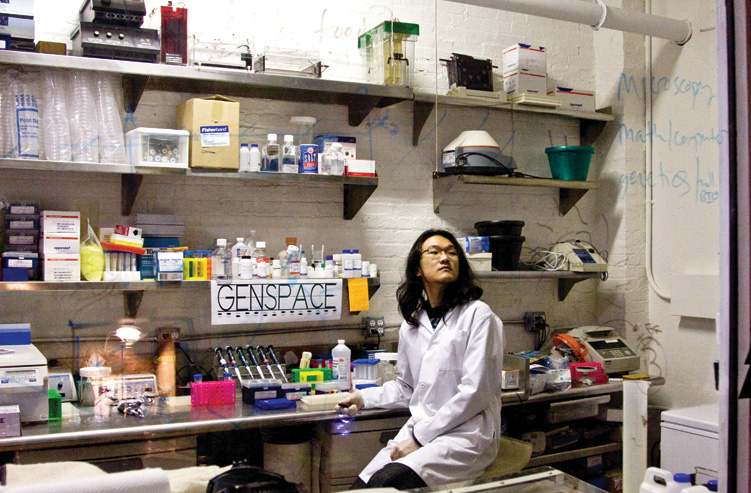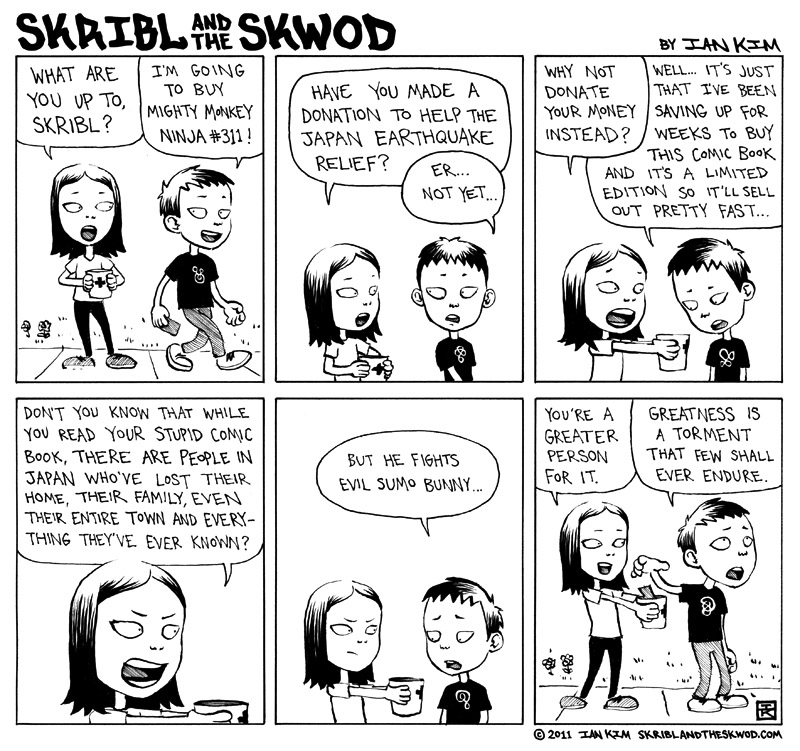 For GenSpace’s Sung won Lim, it’s more like “do-it-yourself biology.”
For GenSpace’s Sung won Lim, it’s more like “do-it-yourself biology.”
by David “Rek” Lee
photograph by Randy Smith
While many of us resent the road to scientific brilliance our tiger mothers mapped out for us, others embraced intellectual discovery and sometimes (gasp) felt deprived of it. Sung won Lim, a product of the underfunded New York City public school system, never laid eyes on a real test tube until college.
He’s now studying physics at New York University, but his lack of traditional science credentials (read: any sort of degree) has not deterred him from the pursuit of indubitable geekdom.
The Korea-born, Bronx-raised Lim, 23, is part of a new movement known as DIYbio, composed of science enthusiasts who have decided the lack of a Ph.D. shouldn’t keep them—or anyone—from carrying out experiments of labyrinth-like complexity.
Labeled a “do-it-yourself biologist,” “garage biologist” or, the infinitely more badass term, a “biohacker,” Lim also helped to boost this basement biology fad by co-founding a community lab last year that is flourishing today.
Dubbed “New York City’s Community Lab” and “a nursery for biotech entrepreneurs,” Gen-Space is a nonprofit organization and membership-based community lab for the amateur/hobbyist scientist. It claims to be the first nonprofit community bio lab in the country, and according to a recent New York Times report, “resembles a makeshift garage lab transported to a light-filled Brooklyn artist’s loft, with the requisite chill, freight elevator and flaking cinderblock walls.”
Run by eight regular members—both obscure hobbyists and legit professors who are attracted by the transparency of the do-it yourself aesthetic—who met through DIYbio.org, the lab promotes education, training and mentoring in molecular science and biotechnology. Translation: You want to explore science projects in a safe, open community? You need education on engineering biology, or training on professional- grade equipment? Go to GenSpace.
“A do-it-yourself project allows you to simply go at it on your own,” says Lim, who lives in Brooklyn. And, “a do-it-yourself biologist is anyone doing biology experiments outside traditional labs, including professionally trained biologists.”
From facilitating workshops to innovating new technologies, Lim and his peers aim to make science feel accessible—even fun. Which shouldn’t be hard for this maverick group of biohackers because they do share a real passion for their historically unsexy field. Also, unlike the traditionally trained and well-funded science lab, GenSpace’s staff and members hail from several fields that include art, engineering, writing and banking. Its diversity, according to the organization, is its strength.
Getting the lab off the ground, however, was an experiment in itself. Lim and his friends had no real financial backing, and tech labs were already dropping like flies due to the economic downturn. But those weren’t the only problems. Potential landlords were put off by this strange group’s mission to experiment with “bacteria to create new forms of life.”
Yet Lim and his friends were able to secure a space in the Metropolitan Exchange Building in downtown Brooklyn—and since, the members have executed a range of complex projects. Lim’s first joint project (with 23-year-old Russell Durrett, a fellow biohacker and lab technician at NYU’s Center for Genomics) traces the migratory pattern of Koreans through shared mitochondrial DNA (mtDNA) sequences. Lim explained—slower this time for the non-science heads—that he ultimately hopes to set up a process whereby people can swab their cheeks with cotton to match up their DNA using existing databases, and discover their ancestral roots. The Korean adoptee may gain a direct link to her biological mother, while others might wield its full power, taking their lineage investigation hundreds of thousands of years back.
Other projects spearheaded by GenSpace members include using chemical tracers to make bacteria travel toward or away from one another in a game of microscopic tag, or launching a stratospheric air sampler device to search for the presence of a microbiome in high altitude.
GenSpace biohobbyists have also worked with the FBI by writing biosafety guidelines with their local Weapons of Mass Destruction Directorate, a government-spawned group created in 2006 to approach matters of nuclear/biological/chemical weapons, with a focus on prevention. In fact, some of the lab’s five advisory board members are FBI agents.
“[The WMDD] want to make sure people with common sense are working in these labs [such as ours], and not complete nut jobs.” In a post-9/11 era, DIY biologists must cooperate with the FBI—just like average commuters must report suspicious bags or travel sans large bottle of lotion. But this doesn’t seem to bother Lim. “It’s [the government’s] job to be paranoid,” he says, as he leans back in his chair, smoothing out the ruffles in his white lab coat.
Whatever projects GenSpace inevitably concocts, Lim revels in what the do-it-yourself mantra has already managed to accomplish: spark interest in science and provide hope for those who wish they had more access to it. “Our movement is inspired by the garage hacking days of the early personal computing era,” he says. “Technology, the internet and synthetic biology have expanded what can be done outside the traditional lab setting.”
“Of course,” he adds, “it’s still a work in progress.”







